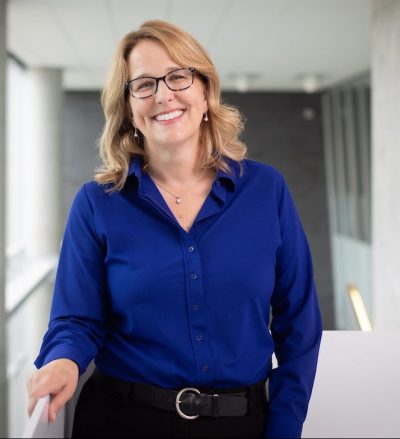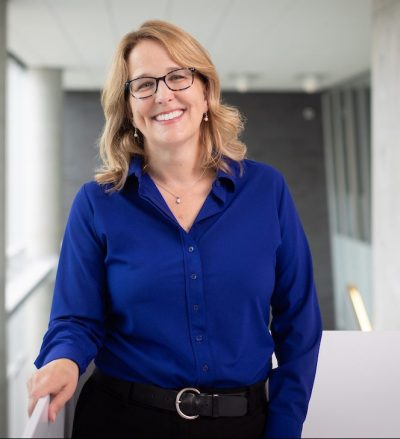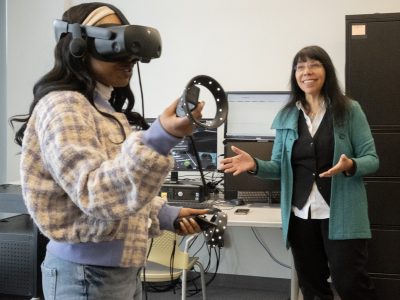Law Professor’s Research Uses Artificial Intelligence to Improve Fairness of Criminal Court Scheduling
A College of Law professor who is an expert on criminal court pretrial appearance is partnering with computer science faculty to see if artificial intelligence tools and optimized data analysis can improve fairness and efficiency in scheduling defendants’ court dates.

Lauryn Gouldin, Crandall Melvin Professor of Law and a 2022-25 Laura J. & L. Douglas Meredith Professor of Teaching Excellence, is one of three researchers on the project, “End-to-End Learning of Fair and Explainable Schedules for Court Systems.” She and Fernando (Nando) Fioretto, assistant professor of computer science at the University of Virginia (formerly of Syracuse University) and William Yeoh, associate professor of computer science and engineering at Washington University in St. Louis received a $600,000 National Science Foundation (NSF) grant for the research. They are examining three issues: the uniformity and fairness of criminal court-date scheduling processes, if individual circumstances are considered when setting court dates, and whether a “smarter” computerized system can produce more equity and efficiency in those processes.
Ensuring that defendants who are released before trial return to court as scheduled is one of the primary goals of the pretrial process, Gouldin says. “Fortunately, data across jurisdictions suggest that most defendants show up for court as required. With bail reform efforts in many jurisdictions leading to higher rates of pretrial release, courts are focused on ensuring that pretrial appearance rates remain high,” she says.
Scheduling court appearances on dates and at times that work for defendants will help keep pretrial appearance rates high and avoid court system inefficiencies, she believes. Many factors—often legitimate hardships—can influence whether a defendant appears in court when scheduled. Gouldin says those factors are not consistently considered by courts and there is little uniformity in how appearance dates are scheduled from court to court.
The researchers are working to produce a system that predicts dates and times when defendants are more likely to appear versus being assigned an arbitrary court date or time. They believe having that knowledge, along with more flexibility in scheduling court dates—such as setting evening or weekend appearance dates—could improve pretrial appearance rates and create a more equitable scheduling process overall.
No-Show Factors
“Whether a defendant can appear in court when assigned depends on individual circumstances. Some may have work or school obligations or need to find childcare or arrange transportation. Others having substance addictions or mental health issues may be more at risk to miss dates; some defendants just don’t understand the court system; and people with disabilities may face specific challenges getting to court on time. In addition, some defendants who must repeatedly return to court can wait all day for their cases to be called, then find out the proceedings are postponed for a month,” Gouldin says.
But criminal courts can be inflexible, she adds. “Maintaining a perfect attendance record under these circumstances, and when so many court appearances are adjourned seems especially unreasonable. I believe courts can likely improve pretrial appearance rates by developing more flexible scheduling practices that account for these challenges.”
Data Input
This summer, Gouldin is working with research assistants to develop partnerships with judges, court administrators, pretrial service offices and criminal defense organizations in Syracuse and across New York State to collect data on the information that courts consider and the processes they use to schedule criminal cases.
Fioretto and Yeoh will take that data and apply what they call “Fair and Explainable Learning to Schedule,” a scheduling approach that integrates machine learning algorithms with mathematical optimization and computerized logical reasoning. The AI-based approach aims to predict dates and times when an individual would be more likely to be able to appear in court. The researchers will incorporate defendants’ potential constraints into the date predictions and then develop mechanisms to ensure that court appearances are scheduled fairly for defendants of different races and genders.
Time, Money Costs
Fairness is an important consideration because judges can impose consequences for missing scheduled appearances even when defendants have justifiable reasons for not showing up, according to Gouldin. “Judges often make high-stakes decisions that implicate fundamental liberty interests, such as detaining defendants before trial or imposing bail, electronic monitoring, pretrial supervision or curfews. Failures to appear also become part of a defendant’s court record and may impact future pretrial liberty.”
The researchers are also mindful of the court’s administrative efficiency goals. Missed court dates mean inconveniences and costs of time and money for judges, attorneys, court personnel, witnesses and other defendants whose cases may be delayed as a result, as well.
Phase 2
Gouldin hopes eventually to gather court appearance data that will include defendants’ demographic details to assess whether specific factors affect the ability or inability to meet a pre-set court appointment. That step could reveal further ways to increase fairness in scheduling, she says. Having individuals return for their court appearances is more important than ever now, Gouldin says, because pretrial reforms in the U.S. over the past 10 years have overhauled traditional money bail systems so that more defendants are released before trial.
Gouldin’s pre-trial appearance work has been cited in federal court decisions, in state and federal amicus briefs and in testimony to the House Judiciary Committee. In 2022, she served as a consulting expert for federal litigation where a Tulsa County, Oklahoma money bail system was eventually deemed unconstitutional. Her article, “Keeping Up Appearances,” an analysis of law and policies governing pretrial appearance, which has been developed in part with the support of the NSF grant, is due to be published in the University of California Davis Law Review later this year.



